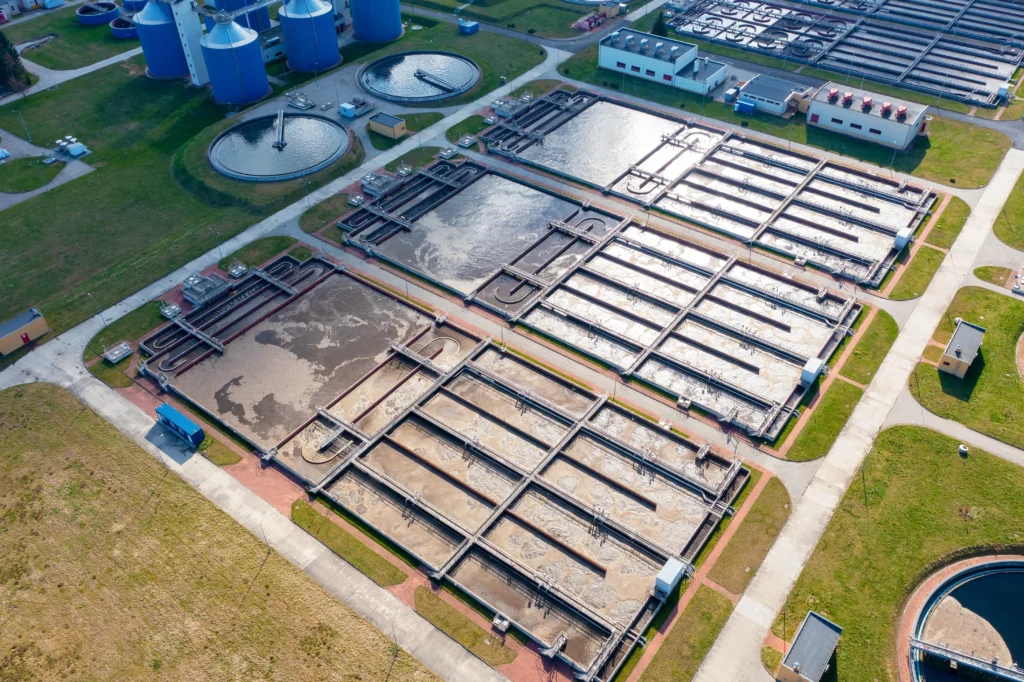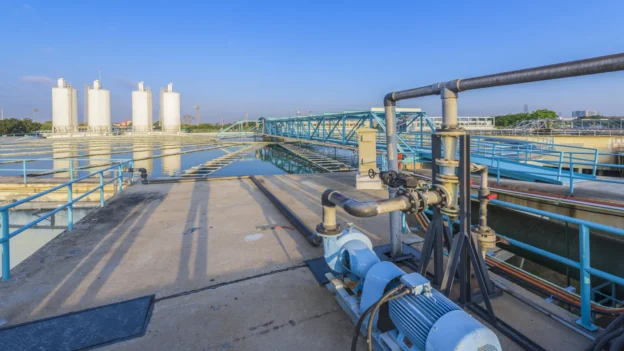The oil and gas (O&G) industry is one of the main wastewater generators due to the high volume of water used in oil extraction and refining. Specifically, in the upstream sector of the hydrocarbon value chain, large volumes of polluting water are recurrently produced. In this context, wastewater treatment in upstream is a critical process to ensure the protection of workers and the environment, maintain product quality, and avoid costs associated with liquid waste management.
Wastewater treatment includes the development, implementation, and service of sludge, wastewater, and water treatment plants for oil refineries, the petrochemical industry, and the gas sector. Water is a key component in the extraction and refining of hydrocarbons, and its quality is significant in processes such as enhanced oil recovery and enhanced chemical recovery. During hydrocarbon production, large quantities of water are generated per barrel of oil, underscoring the imperative need for adequate treatment of this wastewater.
An ineffective treatment process can result in several risks and technical problems, such as: Corrosion of equipment, caused by impurities and contaminants in the water, can affect the integrity of the facilities; in addition, contamination of soil, water, and air by liquid and solid waste from exploration, drilling, production and refining operations can have serious environmental impacts. Finally, excessive consumption of fresh water for these operations can compromise the availability and quality of this vital resource.
The purpose of this article is to highlight the importance of wastewater treatment in the upstream sector and how the implementation of effective solutions can help mitigate these challenges, promoting more sustainable practices in the oil industry.
Wastewater treatment in upstream
It is a process that involves the purification and adequacy of water used in various industrial operations, such as exploration, drilling, production and refining. According to the above, this treatment is essential to reduce the impurities and chemical substances in the water used in these operations, which represent a threat to the environment.
There are several purposes of upstream wastewater treatment. First and foremost, it allows compliance with environmental regulations, which impose strict regulations on the management of contaminated water to protect the environment. In addition, such treatment allows water to be reused, which contributes to the reduction of freshwater withdrawal and, consequently, to savings in operating costs.

The objective of wastewater treatment is to transform contaminated water into a safer and reusable form, minimizing risks such as scaling, corrosion, and other problems in production equipment. This, in turn, improves productivity and reduces downtime in industrial operations, ensuring efficient and sustainable operation of the oil industry.
Importance of wastewater treatment in upstream operations
Environmental impact
Treating wastewater in upstream operations allows the reduction of environmental impact by reusing treated water, and also generates the diversification of uses in other activities such as agriculture and livestock, as long as quality requirements are met. It also protects the environment by avoiding the discharge of contaminated water, thus minimizing the ecological impact.
Regulatory compliance
Wastewater treatment in upstream operations is essential to comply with the guidelines of agencies such as the Environmental Protection Agency, which has a number of regulations on petroleum refining effluents. Compliance with such regulations helps minimize environmental impact by controlling direct and indirect discharges, thus promoting a more responsible and environmentally conscious petroleum industry.
Operational efficiency
Wastewater management improves operational efficiency by optimizing the chemical recovery of oil and the hydraulic fracturing process. This solution increases infrastructure productivity rates and secures equipment used in upstream operations by eliminating elements that could clog machinery and equipment. This ensures the continuous and efficient operation of the equipment, minimizing interruptions and maintenance costs.
Processes and techniques for wastewater treatment in the upstream sector
Treatment techniques
Primary treatment
The first phase of the upstream wastewater treatment process consists of the removal of oils and sediments present in wastewater in order to reduce overloads and other problems in downstream treatment processes. The filtration and sedimentation phase is developed through water treatment technologies, such as oil/water separators, used for applications such as tank washing, desalination waste abatement, and storm water.
In addition to using hydrocarbon separators for the removal of suspended solids and organic matter, dissolved air flotation (DAF) systems and sedimentation tanks are used in conjunction. The combination of such equipment and assets provides a system that separates hydrocarbons, impurities, and floating solids, thus optimizing the efficiency of the wastewater treatment and reuse process.
Secondary treatment
This phase focuses on the removal of organic matter and contaminants present in the wastewater through biological processes. Among the most common biological methods are activated sludge processes, trickling filters, and membrane bioreactor (MBR) systems. The main objective of such treatments is to decompose the pollutants present to facilitate the reuse of wastewater, being considered as a fundamental point in the refining industry.
Tertiary treatment
This advanced process applies sophisticated water treatment technologies, such as filtration at micro, ultra, and nano levels, along with methods such as reverse osmosis. Reverse osmosis is particularly noteworthy for its versatility and multiple applications in the oil industry.
It is a fundamental methodology for the treatment of upstream wastewater, eliminating contaminants and allowing its reuse in production processes. In addition, the water treated by reverse osmosis prevents corrosion and scale formation in equipment and pipes, which ensures the useful life of the assets and reduces maintenance costs.
Maintenance and monitoring
Monitoring and maintenance of upstream water treatment systems is a necessary factor for several reasons, one of which is to ensure these systems provide environmental protection. Additionally, it allows accurate and reliable control of the relevant parameters in the separation and treatment of hydrocarbons and wastewater to function correctly, allowing the reuse of wastewater.
Continuous monitoring of physicochemical parameters such as turbidity, pH, conductivity, hardness, and the presence of impurities ensures that the treated water meets the required specifications.
In the context of reverse osmosis treatment, it is crucial to control the quality, pressure, and flow rate of the feed water, as these factors directly affect the lifetime of the membranes and the quality of the treated water. On the other hand, magnitudes such as pressure and flow rate must be continuously monitored to maintain the integrity of the treatment systems and to optimize their performance in case of adjustments.
Using advanced technologies such as sensors and online monitoring systems allows for real-time data on the current status of the wastewater treatment system. Integrating these devices with automated control systems allows for better decision-making when making adjustments as needed.
Developing a proactive maintenance approach is essential to avoid system failures and prolong the good performance of water treatment technologies. This should include regular inspection and cleaning of equipment, calibration of sensors and measuring equipment, as well as implementation of preventive maintenance plans. In this way, potential problems can be detected and timely interventions can be made, minimizing downtime and ensuring the continuity of water treatment.
Conclusions
The importance of wastewater treatment in upstream lies in its ability to ensure operational sustainability and compliance with strict environmental regulations that are of great importance to this oil and gas sector. Considering the storage of large volumes of water for activities such as exploration, drilling, and refining, wastewater reuse represents an essential practice for the oil and gas industry. This involves the removal of impurities and chemical contaminants so that treated water can be safely reused or discharged without causing any negative impact on the environment.
Reusing wastewater in the upstream sector, in addition to boosting environmental protection practices, also helps improve the sector’s operational efficiency and reduces costs by improving the performance of assets and equipment. By transforming contaminated water into a safe and reusable resource, the risks of scaling and corrosion in equipment are mitigated, thus ensuring the continuity and sustainability of upstream operations.
References
- https://www.wateronline.com/doc/wastewater-treatment-in-oil-refineries-0001
- https://www.epa.gov/eg/petroleum-refining-effluent-guidelines
- https://sigmadafclarifiers.com/en/sistemas-daf-para-el-tratamiento-de-aguas-residuales-de-refinerias-de-petroleo

